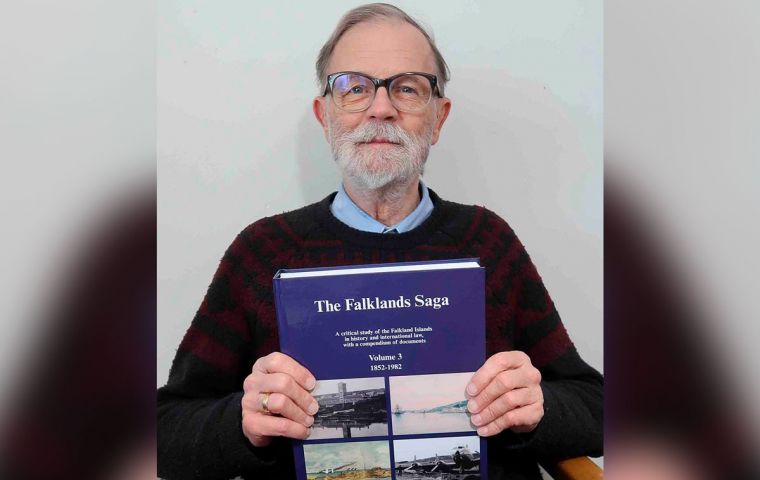MercoPress. South Atlantic News Agency
Pascoe's third volume of “Falklands Saga,” covering 1852/1982
 Pascoe traces the gradual growth of the Malvinas lobby until the claim became Argentine government policy with the arrival of General Peron.
Pascoe traces the gradual growth of the Malvinas lobby until the claim became Argentine government policy with the arrival of General Peron.  The cover of the third volume of “Falklands Saga”, a masterpiece by Dr. Graham Pascoe and covers the period from 1852 to 1982
The cover of the third volume of “Falklands Saga”, a masterpiece by Dr. Graham Pascoe and covers the period from 1852 to 1982The third volume of Graham Pascoe’s Falklands Saga has been published: it is as substantial as his two earlier volumes – 730 pages – and covers the period 1852 to 1982.
At the start of the volume, Argentina had just signed the Convention of Peace in 1850 and accepted British ownership of the Islands.
Apart from a brief spat in the 1880s over a map released in Buenos Aires showing the Falklands as Argentine, this remained the situation for much of the early twentieth century. But Pascoe traces the gradual growth of the Malvinas lobby until the claim became government policy with the arrival of General Peron.
This is about as complete a history of the Islands as it is possible to obtain, which covers the long course of Anglo/Argentine negotiations, the debates at the United Nations plus a detailed account of life in Stanley and Camp.
Pascoe’s scholarship is truly formidable: he has read absolutely everything written about the Islands (there are fourteen pages of bibliography) and spoken to various witnesses of events – the names of John Allan, Graham Bound, Mensun Bound, Jane Cameron, Gerald Cheek, Patrick Watts and others recur.
He even quotes young Roxanne King’s Falkland Islands Journal article on the Globe Store.
As in the earlier two volumes, he is brutal in his dismissal of most Argentine historians, though happy to acknowledge the few who do report events accurately.
The major events in Islands’ history are covered in vivid detail.
The two naval battles of 1914 and the Battle of the River Plate in 1939 are described with expertise and enthusiasm and Pascoe’s expert knowledge of German is shown to advantage.
He charts the slow decline in Anglo/Argentine relations up to the invasion of April 1982 and traces the Argentine decision to invade in a detail which was new to me.
His account of the 48 hours leading up to the invasion, leaves me in no doubt that the description of the Falklands War and of the past 40 years in volume 4 will be comprehensive and well written.
The book is available from www.falklandshistory.com and costs a hefty £98 to purchase.
But like the two earlier volumes of The Falklands Saga it simply lays a new foundation for Falklands history and is written by someone who combines evident affection for the Islands and their people with rigorous scholarship and a total mastery of his material.
- The current article was written by David Tatham, a former Foreign Office diplomat who was governor of the Falkland Islands among his many diplomatic appointments. On retirement he has dedicated his life to Falklands issues and history and has been editor of the Dictionary of Falklands Biographies and chairman of the Falkland Islands Association.
According to Tatham The Falklands Saga is a groundbreaking study, the result of over 20 years of research in archives and libraries in Buenos Aires, La Plata, Montevideo, London, Cambridge, Stanley, Paris, Munich and Washington DC.
Tatham was also among 52 senior British diplomats who in 2004 signed a letter to then British Prime Minister, Tony Blair, criticising his Middle East policy. The letter was described as “unprecedented in scope and scale”.




Top Comments
Disclaimer & comment rules-

-

-

Read all commentsSupreme work that confines the Malvinas myth and its indoctrinated following to the scrapheap.
Jun 10th, 2023 - 09:17 am +4Great work. Well done Graham!
Malv
Jun 10th, 2023 - 11:59 am +4‘1840: The British approve the formation of a colony on the islands.’
Before which it was British Crown Territory, which the Spanish had to accept as seen in the Anglo Spanish agreement of 1771.
‘At the start of the volume, Argentina had just signed the Convention of Peace in 1850 and accepted British ownership of the Islands.’
Maybe you should read the book and see what supporting evidence there is, like the 1850 agreement itself.
Instead of just repeating the same old propaganda which has been rebutted here many times already.
If this ever gets to a court, it will be the evidence that counts, not the unsubstantiated propaganda.
Marv, a Crown possession from 1765. A colony is something else.
Jun 10th, 2023 - 12:38 pm +4https://falklandstimeline.files.wordpress.com/2022/11/1763-to-1766.pdf
Commenting for this story is now closed.
If you have a Facebook account, become a fan and comment on our Facebook Page!